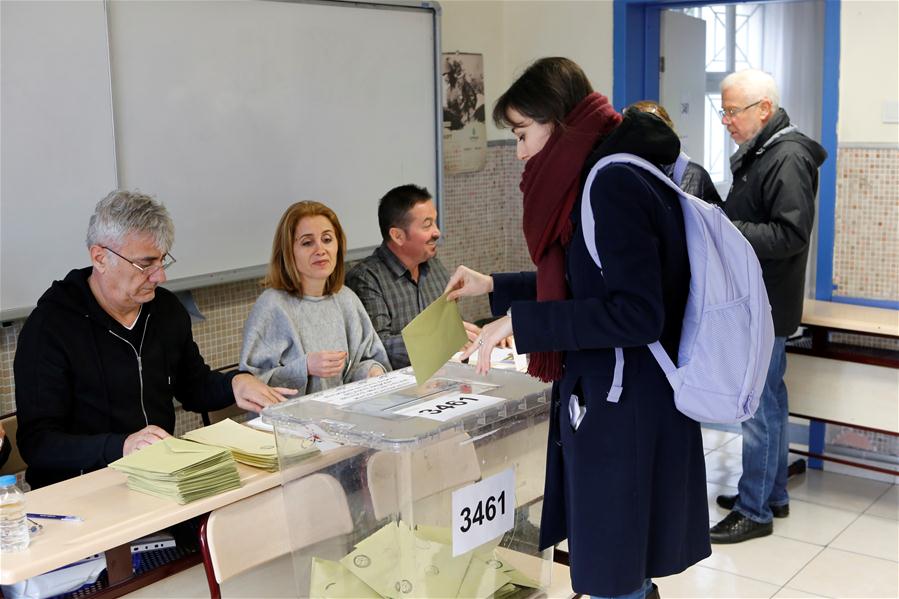
A voter casts her ballot during Turkey's local elections in Ankara, Turkey, March 31, 2019. Turkish voters are heading to polling stations on Sunday for local elections, as concerns are growing about high inflation and fluctuations in exchange rates. More than 57 million Turks in 81 provinces, with more than 10 million in Turkey's largest city of Istanbul, are eligible to vote for mayors, neighborhood heads and members of local councils, according to the latest figures. (Xinhua/Qin Yanyang)
by Burak Akinci
ANKARA, April 1 (Xinhua) -- Turkish President Recep Tayyip Erdogan suffered a bitter setback as his ruling party lost control of the capital Ankara in Sunday's local elections and the race tipped towards the opposition in Istanbul, the country's largest city.
The key mayoral elections across Turkey were the first since Erdogan assumed sweeping executive powers after a previous election in June 2018 and are seen as a confidence test for his 16-year rule amid a sharp economic downturn.
The struggle was between two coalitions: Erdogan's Justice and Development Party (AKP) and the Nationalist Movement Party (MHP) that have formed the People's Alliance, and the opposition parties led by the main opposition Republican People's Party (CHP), which have put together the Nation's Alliance.
The main battlegrounds for Sunday's elections were Istanbul and Ankara.
Turkish broadcasters said that Mansur Yavas, candidate of the opposition, won the race in Ankara with more than 50 percent of the votes and it was the first time that Erdogan was defeated in the center of Turkish political power.
As for the Turkish leader's hometown Istanbul, Turkey's most populous economic hub, eyes were on the unprecedented tight race between AKP's former prime minister Binali Yildirim and the opposition candidate Ekrem Imamoglu.
Both men claimed victory, but on Monday, the Supreme Election Council (YSK) announced that Imamoglu had a slim lead with about 28,000 votes, a gap which would be difficult to close for his opponent.
Losing the city where he ran as the mayor would give Erdogan a severe blow.
"This is a historic event, because Erdogan himself was mayor of Istanbul in the 1990s before he launched the AKP," political analyst Rusen Cakir said on Twitter.
CHP also held its Aegean coastal stronghold of Izmir, Turkey's third largest city, and took control of big cities in the south such as Antalya, Adana and Mersin.
"People have voted in favor of democracy. They have chosen democracy and they have rejected the language of polarization," said CHP leader Kemal Kilicdaroglu, referring to Erdogan who used a strong rhetoric against the opposition, branding the polls as a matter of "survival."
In his speeches to supporters in Ankara and Istanbul, Erdogan hailed what he called a "victory" for his alliance who won nationally a majority of mayoral seats but lost pivotal cities, and pledged that Turkey would now focus on its troubled economy in the run-up to national elections in 2023.
"We have a long period ahead of carrying out economic reforms without compromising the rules of the free-market economy," Erdogan told reporters. He also insisted that his party would self-reflect on poor results in some cities.
Erdogan's support has been based on strong economic growth, and analysts agree that the economic recession triggered by a currency meltdown in last summer is the main reason of his setback.
"There are important messages given by voters to both the ruling party and the opposition. Electors decided in favor of stability but also warned the government without shattering the political spectrum," analyst Abdulkadir Selvi said in Hurriyet daily.
The results of the local elections have no direct bearing on the central government and Erdogan has already made it clear that he is remaining the head of Turkey and particularly its economy.
But he also has to make good of his promises to bring the ailing Turkish economy to safer shores and take new measures to build up confidence among the disgruntled consumers, experts said.
"Turkey needs a sustainable plan to overcome this recession ... otherwise, the bill that Turks have to pay in the near future will be much more significant and painful," Yalcin Karatepe, economist and academic from the Ankara University, told Xinhua.
He added that although Erdogan has ruled it out repeatedly, Turkey would need high sums of foreign cash and the International Monetary Fund is the most likely address for that after the elections.















